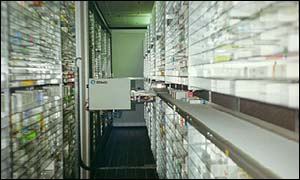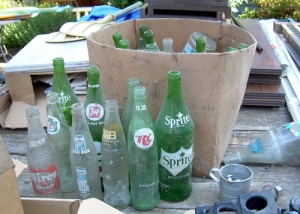As someone who has spent some time researching my family history, I remember the surprise when I found a distant relative of mine had been a dog-whipper in the mid 1700’s.

As an avid dog lover this was something of a horrific finding. In fact, after a little research although not wonderful, I found that this late in century there was no longer any whipping involved. In fact, this job was a type of church-warden who’s role was to chase off (or in extremis remove) dogs during church services.
Historically, it had not been uncommon for dogs to accompany their owners to church, often with interesting consequences. The preferred tools of the trade were actually a large pair of wooden tongs often padded with leather pads or netting with which to remove the errant hounds. The dog whippers had disappeared shortly afterwards as it became socially unacceptable to take dogs into churches.
Searching through census returns of the last hundred years it started to become something of a side interest when I found a particularly interesting occupation.

The most likely reason for the disappearance of occupations before the industrial revolution was a change in social convention. However, after the industrial revolution the introduction of technology takes over and makes roles which were once considered indispensable redundant.
One of the more common roles was the lamplighter who wandered the streets of 19th century towns lighting and extinguishing the gas lamps of the time. It was seen as one of the more secure semi-skilled jobs of the time – after all what could replace gas lights. When automated town gas and early electric lighting emerged, this didn’t stop the occupation from disappearing in little over 10 years.

This then brings us to the deliciously named knocker-uppers who were key to the maintenance of an effective workforce until well into the Victorian era.
Shared houses held several families, clocks and watches cost the equivalent of several weeks wages and those late for work were simply replaced by willing replacements queuing for work at factory offices. Given that, for our Victorian forebears, having a reliable timepiece could provide one of the most lucrative if antisocial jobs of the time.
Charging each household a weekly fee of between a farthing and sixpence, the household could ensure that they would be woken (or knocked) up in time for them to start work. Some contemporary authors indicate that the knocker-upper was often paid second only to the landlord. Without turning up on time the likelihood of the workhouse or penury increased beyond measure. This role continued to be vital until the introduction of factory clocks and systems such as steam whistles indicating the start of the working day. However, the demise of this job is perhaps the most sudden with the role disappearing entirely within a period of three to five years.

Of course, those with skilled occupations have managed to fight off the rise of technology for longer. The dexterity, attention to detail speed and ability to work in reversed text had made the typesetter a skilled occupation from Tudor times until well into the 1980’s.
However, this has changed with the growth of computerised technology, mobile working and the introduction of laser and thermal printing. These developments have seen the typesetter consigned to the list of historic occupations. It was perhaps the earliest example of technology moving into and replacing skilled workers.
Despite these advances, the rise of technology was typically limited to replacement technologies or the introduction of computer processing making many administrative roles redundant. Until recent years, it was more uncommon to see more complex functions replaced. That may soon change with a new range of robotics making new inroads into areas previously very much the domain of a human workforce.
Now, robots are making significant inroads into the workplace, again following the same pattern with less skilled work. Farmhands, milkers, stockmen and cattle herders are being replaced across the United States and Europe.
Cattle no longer graze in fields with scheduled milking times but instead attend a robotic milking parlour when they want food. On arrival a robotic milking arm identifies the specific cow, scans the udder to ensure the optimum milking technique for the particular animal. It then applies a milking cup and orders food for the cow to be dispensed.
Meanwhile a second robot monitors the feed ensuring waste is reduced by sweeping feed back towards the cattle and dispensing food only to the bays where cattle are waiting. Whilst farmers report up to 30% increase in yield these advances have been far from universally popular. Concerns over the welfare of grazing animals being permanently ‘housed’ and significant reductions in workforce make this an innovation feared by many. The parlour can replace a team of 5-6 herdsmen with a single ipod or tablet control.
 With increasing amounts of retail transactions completed online we have already seen retail jobs reducing as large warehouses servicing internet orders increasingly take their place.
With increasing amounts of retail transactions completed online we have already seen retail jobs reducing as large warehouses servicing internet orders increasingly take their place.
Even here, human interaction is becoming entirely optional. The new Amazon warehousing systems have replaced significant numbers of fork lift drivers, warehouse workers, packers and dispatchers. Automated pallet, storage and picking robots ensure that goods are picked within seconds of an order having been placed. It even has hidden impacts such as the fact that fewer safety/health and safety officers are required as the warehouse spaces have effectively become human free zones reducing the opportunity for injury significantly.
 Now, using similar technology, the robots are starting to breach the semi-skilled and skilled environments. Hospitals are now reducing the number of pharmacists as medicine storage, replenishment, distribution and delivery are run via a fully robotic pharmacy.
Now, using similar technology, the robots are starting to breach the semi-skilled and skilled environments. Hospitals are now reducing the number of pharmacists as medicine storage, replenishment, distribution and delivery are run via a fully robotic pharmacy.
Two new build hospitals in the United Kingdom also have an underground level with robotic porters. Guided beds are integrated with the door and lift controls and the underground level allows access across the entire hospital site.
The question for most of us remains, how liable is my job or occupation to be overtaken by automation. Of course in the past this would have been something a consultant or business analyst may have helped you assess. Now, the groundwork has been done and published on the web. (Another role bites the dust).
In recent years the questions being asked were around what we would do with all the spare time automation would give us. Now, it seems to me that we are more likely to be asking what on earth will people still be employed to do? Other than those selling or servicing robotic workforces, there is also the question of how we will earn money to buy whatever is being mechanically produced, sold and distributed. It’s a shame robots don’t need knocker-uppers !


















You must be logged in to post a comment.